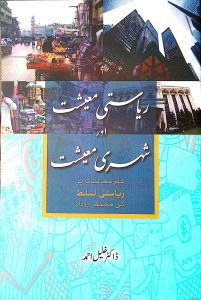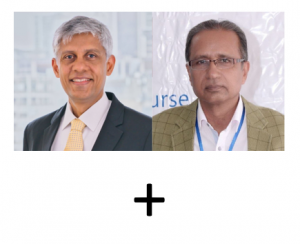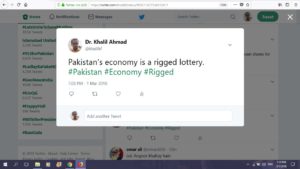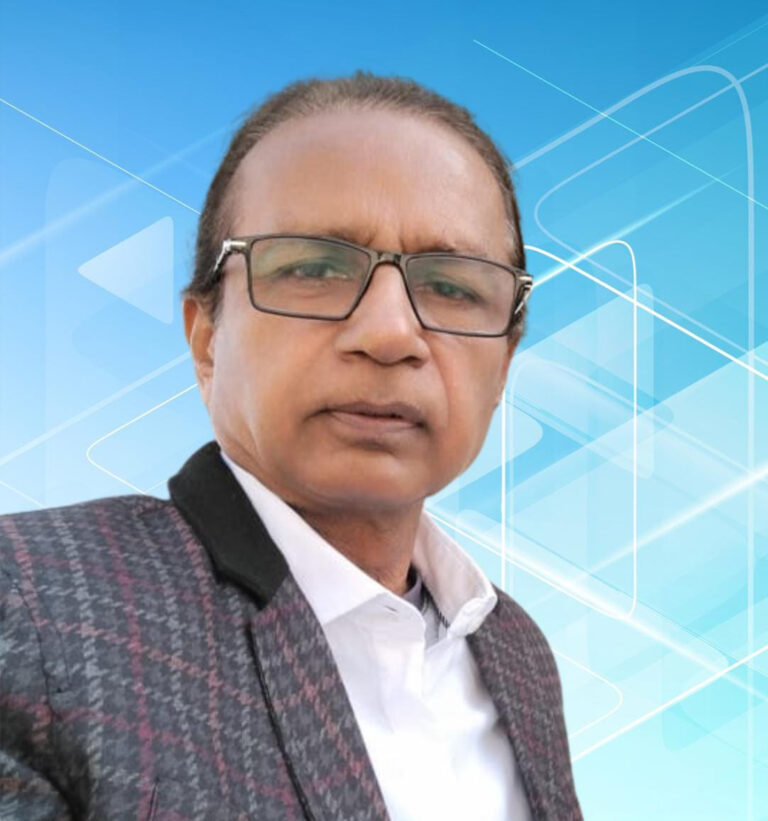ریاستی معیشت اور شہری معیشت:
علمِ معاشیات پر ریاستی تسلط کی مختصر روداد

Published by Prime Institute, Islamabad
www.PrimeInstitute.org
Oder form: https://docs.google.com/forms/d/1L1Ah8LZt9ue-DOYbVhT3bc1ziSF0y6kyxJsoQ6BgkSo/viewform?edit_requested=true&gxids=7628…
Here is the link to the original conversation:
https://pakpoliticaleconomy.com/?p=1774
As Jayant Bhandari and I conversed, a few others joined. Since they commented publicly, below are copied, though anonymously, what did they add.
 Anonymous 1: “state fulfilling its constitutional role/responsibilities”, “Form a political party to work as an institution”. ??? How much longer can grown-ups believe in these fairy tales of a benevolent state controlled by a political process – when the reality, right before their eyes, is so different, and not in a good way?
Anonymous 1: “state fulfilling its constitutional role/responsibilities”, “Form a political party to work as an institution”. ??? How much longer can grown-ups believe in these fairy tales of a benevolent state controlled by a political process – when the reality, right before their eyes, is so different, and not in a good way?
Khalil Ahmad: I fear you miss the context of the discussion. The context is Pakistan and India, especially.
Anonymous 1: Pakistan and India – even more so. Transpose the western idea (a fairy tale, really) of a enlightened benevolent state responsive to political process inputs, and viola! – we have two examples of prosperity and peace – India and Pakistan
KA: First I didn’t talk …
Jayant Bhandari is an Indian who left India and settled in Canada. I never met him. He’s a Facebook friend. His posts generate thoughtful discussions and that’s how we both found each other in a good friendly relation.
I did try to leave Pakistan during my teen years, and failed. Later I abandoned the idea of leaving the country for obvious “reasons.” I wanted to do my bit to free our people from the pseudo shackles made of unfounded notions by the Riyasati Ashrafiya (ریاستی اشرافیہ) of Pakistan.
What is common between Jayant and I is the deep concern for the freedom, well-being and happiness of our respective people. And no doubt for the larger humanity too.
Early this January one post of Jayant attracted my attention. It was an excerpt from one of his articles: First World, Third World.
“Irrespective of the merit of what Trump did, those who …
نوٹ: یہ تحریر 13 دسمبر 2019 کو ’’نیا دور‘‘ پر شائع ہوئی۔
https://urdu.nayadaur.tv/26108/
لاہور میں دل کے ہسپتال پر وکلا کا دھاوا کوئی پہلا واقعہ نہیں۔ یہ آخری واقعہ بھی نہیں ہو گا۔
تو پھر خرابی کہاں ہے؟
سوال تو یہ ہے کہ خرابی کہاں نہیں؟
بس ایک آئین ہے، جس سے امید باندھی جا سکتی ہے۔ مگر آئین تو محض ایک اخلاقی دستاویز ہے۔ اس پر عمل تو ہوتا نہیں۔
طاقت ور گروہ اس پر عمل نہیں ہونے دیتے۔ ریاستی اشرافیہ، اور اس کے مختلف طبقات، جیسے کہ سیاسی اشرافیہ، فوجی اشرافیہ، کاروباری اشرافیہ، وغیرہ، اس پر عمل نہیں ہونے دیتے۔ اشرافیہ کے طبقات نے ریاست اور اس کے وسائل پر قبضہ کیا ہوا ہے۔ یہ آئین اور قانون کو اپنی ضرورت اور فائدے کے مطابق ڈھالتے اور توڑمروڑ لیتے ہیں۔
یعنی جیسا کہ عیاں ہے کہ ریاست لوگوں کے لیے ہوتی ہے، لوگ ریاست کے لیے نہیں۔ مگر …
سیاسی قضیے: اتوار 11 مارچ، 2018
ایک جانور بھی کسی جگہ رہتا ہے تو اسے اس جگہ سے کچھ نہ کچھ لگاؤ ہو جاتا ہے۔ مگر یہ پاکستان کیسا ملک ہے، اس کے اشرافی طبقات کو ستر برس بعد بھی اس ملک، اس کی زمین، اس کے لوگوں سے ذرا بھی تعلق نہیں۔ ملک کی سیاست اور معیشت پر نظر ڈالیں تو یوں محسوس ہوتا ہے کہ جیسے مالِ غنیمت کو لوٹنے کی دوڑ لگی ہوئی ہے، اور یہی وہ سبب ہے کہ ہر ادارہ سیاسی ریشہ دوانیوں سے گہنایا ہوا ہے۔
زیادہ دور نہیں جاتے۔ صرف گذشتہ دو حکومتوں کو پیشِ نظر رکھ لیں، یعنی پیپلز پارٹی اور حالیہ مسلم لیگ ن کی حکومت۔ ابھی اس قضیے کو رہنے دیتے ہیں کہ انھوں نے کیا کیا اور ان کی کارکردگی کیسی رہی۔ ابھی صرف یہ دیکھتے ہیں کہ ان کے ساتھ کیا کچھ کیا جاتا رہا۔ غالباً انھیں ایک …
Pakistan’s economy is a rigged lottery.

…
As far as the interpretation of the article 184 is concerned, common-sense understanding is altogether different. It has three clauses that form the whole of this article. Its title is: The Original Jurisdiction of Supreme Court.
The first clause states: (1) The Supreme Court shall, to the exclusion of every other court, have original jurisdiction in any dispute between any two or more governments.
The second clause states: (2) In the exercise of the jurisdiction conferred on it by clause (1), the Supreme Court shall pronounce declaratory judgments only.
The third and the last clause states: (3) Without prejudice to Article 199, the Supreme Court shall, if it considers that a question of public importance with reference to the enforcement of any of the Fundamental Rights conferred by Chapter 1 of Part II is involved, have the power to make an order of the nature mentioned in the said Article.…
The title of this piece appears to be problematic. One can argue how cynicism may be confined to geographical specifications such as one of Pakistani type. But Pakistani cynicism may be justified on the ground that whatever its general meaning, the way a cynicism formulates in a society makes it special. Thus this piece tries to identify specific Pakistani attributes of cynicism.
Let’s try to have an idea of what cynicism generally stands for. First, it implies that all the ‘people are motivated by selfishness.’ Another most important and most common trait is that a cynic’s ‘outlook is scornfully and often habitually negative.’
As a philosophical term cynicism means something quite different. It was ‘a sect of ancient Greek philosophers who believed virtue to be the only good and self-control to be the only means of achieving virtue.’ So, philosophically cynicism relates to the Cynics and their beliefs.
In order to understand the wider meaning of cynicism, a
Better to start with two clarifications: First, this piece does not raise the question of Pakistani state’s viability in the sense Pakistan’s Leftists and liberals are wont to discuss it. They say something like that: It’s unviable because it was created by the British in line with their policy of Divide and Rule; It’s unviable because it was created by the narrow-mindedness of Hindus or the Congress, or the stubbornness of Muslims or the League. They also hold that: It’s unviable because religion is never the basis of any state. The writer prospectively believes that states are not rational entities; they may come into existence, and disintegrate and disperse into more entities with or without any rational justifications. It’s like individuals or groups of human beings who want to live separately for any concrete or imagined grievances or none at all that
…
In the matters of running the state of Pakistan, penetration of politics, politicians and political considerations have marred the capability of the state to think clearly, act accordingly and punish promptly; which has weakened it to such an extent that in most of the cases the state is conspicuous by its absence, resulting in increasing anarchy in the country. It was back in 1953 that Justice Munir Inquiry Report concluded thus: “And it is our deep conviction that if the Ahrar had been treated as a pure question of law and order, without any political considerations, one District Magistrate and one Superintendent of Police could have dealt with them. Consequently, we are prompted by something that they call a human conscience to enquire whether, in our present state of political development, the administrative problem of law and order cannot be divorced from
…
The blood of “Minorities” and the flag of Pakistan!
Note: This comment and the picture was originally posted on August 14, 2014.
In Pakistan, everything stands politicized. So is religion. Those who are clever enough make hay while the sun shines. Tahir-ul-Qadri is one of them and is famously know as a religio-political power seeker. He is more of a religious leader; trying his luck in politics. Since the Pakistan Awami Tehreek (PAT) was founded about two decades ago, it has constantly been failing in winning the voters’ mandate. It never made any headway in any general elections. So the PAT is a party, like so many others having this or that much of following in various parts of Pakistan, which has been forced to indulge in politics outside the parliament.
No doubt, it’s such a phenomenon which has yet to attract the attention of the social and political academics. How such parties survive and behave which remain outside the parliament since they succeed
The place is not far from Islamabad. A three hour drive and one is far away from almost everything Pakistani. Not only is the weather pleasanter; this small place presents the ethos of a non-Pakistani world. Here it is just one road on both sides of which are located a number of hotels and other shops. It was evening time and I was sitting in the restaurant of a hotel and looking through the window-glass out on the road. It was no crowding here, only a few visitors doing shopping and walking on the road. On the right side from where the road seems to come, I could see just the same scene. Look straight where the road was goes to, I could see the road turning towards left and disappearing.
The sky was cloudy and a cool breeze was flowing with
It is essential to seek out enemy agents who have come to conduct espionage against you and to bribe them to serve you. Give them instructions and care for them. Thus doubled agents are recruited and used. [Sun Tzu]
Before March 9, 2007, it was all dark on the horizon of Pakistan. A military dictator was ruling while dressed in khaki uniform; he was intent upon continuing his rule for the next 5 years; and the criminal politicians were all ready to help him rule for more than a hundred years. Such was the hopelessness that no rational being could dream of a silver lining. One could only fear what happened to Iraq after it grabbed Kuwait, may not happen to Pakistan.
All of a sudden, and it was just like a bolt from the blue, a hope started taking shape. First time in Pakistan, the point was made that
Mr. Khan now be serious! Somehow the circumstances have made you a political leader. Now you lead a political party, which has a considerable following; no matter which class or classes it consists of. The followers of your party, they are all Pakistanis, and enjoy the same political choices as the followers of other political parties do.
It was just non-serious and out of sync when recently you spoke in Islamabad, and said, ‘I was boring; New Pakistan was not anywhere on the scene coming into being. Then I thought something had to be done.’ Regarding this, you need to ask yourself: Is it political? Is there in politics anything like boring, and that it exhorts you to do something, such as organizing rallies and doing “political fun.”
It’s quite a pertinent question that must be put to you and you must answer it clearly; no hanky-panky, please! What you
Mr. Prime Minister! You are better placed than any other Pakistani citizen, since you are sitting in the center of the state. The office you occupy by virtue of your electoral mandate is where the state authority converges, and it is from where authority flows to other institutions of the state in accordance with the dictates of the constitution of the country.
Mr. Prime Minister! You are the Chief Executive of the state of Pakistan, and as far as flow of information regarding the affairs of the state is concerned, in comparison to you this writer is merely an ignoramus. In case the present government of your party is toppled, the first casualty will be you, the prime minister; that means whatever future plans are being hatched anywhere, or whatever conspiracies are being woven in any quarters of the corridors of the powers against your government, you must be in
The cities and suburbs of Pakistan are bursting with millions of teeming citizens, old and young, men and women and children alike. They earn their livelihood by small selling of goods or services which unimaginably involves hard labor with meager income. Or they are employed by private entrepreneurs who have to incessantly struggle against the vagaries of state’s regulators and tax officials. They form the larger chunk of a population of 18 million plus. It is they who cast vote to send a political party in the parliament, but cherish no hope this will ameliorate their life conditions they know from their past experience. This is one side of the picture.
The other side reveals itself in the headlines of the daily newspapers and news channels. One newspaper’s headline reads as: army chief pays morale boosting visit to ISI HQ (Inter-Services Intelligence Headqarters). Another headline says: defense ministry seeks cancellation
In Pakistan, the state is the problem!
See these pictures:
Women protest Muridke police torture of Razia Bibi, who was on full-term, that caused a still-birth
People of Manga Mandi demonstrate against police
[The News, April 9, 2014]
Note: This was originally posted in April 2014.
Here is what the upper house of the Pakistani parliament is interested in:
Greener pastures: Senators seek equal share in foreign trips
[The Express Tribune, April 14, 2014]
Note: This was originally posted on April 14, 2014.
Here is the media release:
New book – “Pakistan’s Democratic Impasse” published
The book indicts politicians as the main culprit for failing the state of Pakistan
The book falsifies the myth of blaming the Pakistan Army for the ills Pakistanis facing
Author argues constitution authorizes politicians to rule, not the Army
Lahore April 8, 2014: Alternate Solutions Institute released today Dr. Khalil Ahmad’s new book, Pakistan’s Democratic Impasse – Analysis and the Way Forward. Already this in 2012 and this February, he has published three books, “Pakistan Mein Riyasti Ashrafiya Ka Urooj” (The Rise of State Aristocracy in Pakistan, February 2012), “Siyasi Partian Ya Siyasi Bandobast: Pakistani Siyasat Ke Pech-o-Khum Ka Falsafiyani Muhakma” (Political Parties Or Political Arrangements: A Philosophical Critique of the Intricacies of Pakistani Politics, July 2012), and, Pakistani Kashakash: Tehleel-O-Tadeel aur Aagay Barhany ka Rasta (Pakistani Armageddon: Analysis,
…

 Anonymous 1: “state fulfilling its constitutional role/responsibilities”, “Form a political party to work as an institution”. ??? How much longer can grown-ups believe in these fairy tales of a benevolent state controlled by a political process – when the reality, right before their eyes, is so different, and not in a good way?
Anonymous 1: “state fulfilling its constitutional role/responsibilities”, “Form a political party to work as an institution”. ??? How much longer can grown-ups believe in these fairy tales of a benevolent state controlled by a political process – when the reality, right before their eyes, is so different, and not in a good way?





